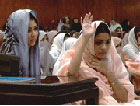
For a Place under the Heavens 2003
Distributed by Women Make Movies, 462 Broadway, New York, NY 10013; 212-925-0606
Produced by Sachithanandam Sathananthan and Philippe Avril
Directed by Sabiha Sumar
VHS, color, 53 min.
Jr. High - Adult
Religious Studies, Human Rights, Asian Studies
Date Entered: 10/01/2004
Reviewed by Paul Moeller, University of Colorado at BoulderFor a Place under the Heavens is a documentary film discussing how women have been coping and surviving with creeping religiosity in Pakistani society. Writer and director, Sabiha Sumar, takes the viewer from the relatively secular nature of the early years of Pakistan’s independence, through the changes introduced by the government of Zia-ul-Haq in the late 1970s and early 1980s, to the heightening of religious fundamentalism in the last couple of decades.
Sumar does an excellent job of showing how religion is affecting the lives of Pakistani women. Through interviews with feminist colleagues, women who have embraced a fundamentalist form of Islam, and a noted Islamic scholar, Sumar is able to show how much has changed since she was a young girl. She discusses this change from a very personal standpoint, contrasting footage of her own second birthday party with that of modern Pakistani street scenes. Sumar complements a fashion model’s determination to live the type of life she desires with a particularly chilling scene in which a mother encourages her infant son to grow up to be a martyr. Sumar is able to question a range of women about their past and current living situations and their hopes for the future. Many of those interviewed expressed a concern for finding their rights within religion and within an increasingly religious Pakistan.
In a particularly notable interview, Sumar engages the religious scholar, Mufti Nizamuddin, in a discussion of Islam and women’s rights. Nizamuddin believes that women can attain equality within Islamic societies if they are willing to demand it. He notes, however, that for men to give up the power they currently hold would take a revolution. Sumar’s film clearly shows that while fundamentalism is on the rise in Pakistan, there are still a number of women who are determined to have a voice in deciding the future of its society.
This film will be of value to viewers with an interest in Pakistan and in the place of women in Islamic societies. It is highly recommended to viewers from junior high school to adult and to the libraries that serve them.